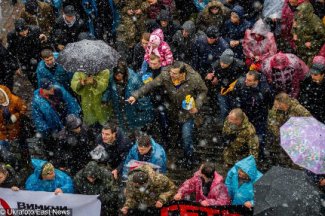Ukraine: a commotion around Saakashvili

On 5 December in Kiev an attempt was made by the security service of Ukraine to detain Mikheil Saakashvili. The police car in which he was to have been taken into custody was blocked by a group of his followers numbering several hundred people. After several minutes, they succeeded in releasing Saakashvili, who then proceeded to the square in front of the Ukrainian parliament. In a speech there he sharply attacked the ruling class and called for the impeachment of President Poroshenko. In the morning of 6 December, the police carried out a raid on the tent city which supporters of Saakashvili had created in November by the parliament, in order to arrest him and break up the protest. There were clashes with the demonstrators, during which several people were injured.
The attempt to arrest Saakashvili, the former Georgian president and ex-governor of the Odessa oblast, is the result of an investigation being conducted by the Prosecutor General of Ukraine, which concerns the alleged receipt by him and his entourage of funds from people associated with Viktor Yanukovych. According to information received by the Prosecutor-General Yuri Lutsenko, the Ukrainian oligarch Serhiy Kurchenko, residing in Russia, allegedly contributed about half a million dollars to Saakashvili’s political activities in Ukraine. As a result, the former Georgian president has been accused of supporting an organised criminal group, and one of his colleagues (who is said to have been responsible for contacts with Kurchenko) is also charged with high treason.
Saakashvili has been in conflict with President Petro Poroshenko for several months; in July this year he was deprived of his Ukrainian citizenship. Since his return to Ukraine (10 September), which took place in an atmosphere of scandal (he illegally crossed the Polish-Ukrainian border with the help of his supporters), he has been conducting vigorous political activity, primarily focused on criticism of President Poroshenko. Since 17 October, people linked to Saakashvili have been conducting a protest near parliament, and on 3 December they organised a march under slogans calling for the President’s impeachment.
Commentary
- Saakashvili has not constituted a serious political threat to Poroshenko, due to his poor cooperation with other opposition groups, his low levels of public support (in September, 70% of Ukrainians evaluated his actions negatively) and the low turnout for the protests he has organised (numbering a few thousand people). From the political point of view his actions, which have compromised and disrupted the unity of the opposition, have actually been helpful to the Ukrainian authorities. Saakashvili’s arrest may have been dictated by personal factors; the former president of Georgia has come into conflict with President Poroshenko, the head of the Interior Ministry Arsen Avakov, and the former Prime Minister Arseniy Yatseniuk. The arrest of Saakashvili and the attempt to compromise him by linking him with Viktor Yanukovich’s people might be a kind of revenge by the Ukrainian government.
- Everything indicates that the operation to arrest Saakashvili had been prepared for a long time. At the moment it is difficult to determine how reasonable the Prosecutor General’s accusations are. Cooperation with Yanukovich’s people would completely discredit Saakashvili. At the same time, the quality of the recordings of the alleged contacts between the representatives of Saakashvili and Kurchenko presented by the Prosecutor General is poor, and it is difficult to judge their credibility. Just the fact of a phone call between the former President of Georgia and a fugitive Ukrainian oligarch makes Saakashvili look bad – although it is not a criminal offence. The former President of Georgia did not say anything during the call which would suggest or confirm that he has any close links with Kurchenko.
- The attempt to arrest Saakashvili also serves as a warning to other politicians who have been criticising the authorities. Yuri Lutsenko has stated that the Saakashvili case has exposed the names of many Ukrainian politicians and businessmen. During his statement to parliament, he said that criminal proceedings could be brought against the most prominent opposition politicians, including Mustafa Nayyem, Svitlana Zalishchuk, Ihor Lutsenko, Viktor Chumak and others. The basis for taking such a step would be proof of their support for Saakashvili’s political activity. The Attorney General also accused the Self-Help of working for Moscow’s money. This means that it cannot be ruled out that during the next weeks or months, there will be further detentions of opposition representatives, as part of the ruling camp’s preparations for the presidential and parliamentary elections in 2019.




